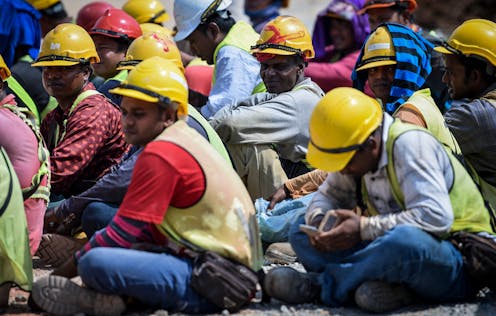More forced marriages and worker exploitation – why Australia needs an anti-slavery commissioner
- Written by The Conversation

Last week, a 47-year-old Queensland man was charged with 46 offences, including torturing and enslaving deckhands on his fishing boats.
The accused allegedly intimidated and attacked his employees, and withheld food and water. He will appear in court next month.
Australia is estimated to have 41,000 people trapped in modern slavery. People can be subjected to modern slavery through coercion, deception and violence. This includes acts such as grooming, wage theft and restriction of movement.
In Australian and international law slavery is defined as:
the condition of a person over whom any or all of the powers attaching to the right of ownership are exercised.
Modern slavery is distinct from historical slavery in that people are no longer legally owned but are instead subjected to illegal control.
What is Australia doing to stop modern slavery?
Forced marriage, forced labour, debt bondage, domestic servitude and deceptive recruitment are on the rise in Australia.
Sadly, global conviction rates are low at (38%). In Australia, only 24 offenders were convicted between 2004 and 30 June 2019.
Despite this, Australia is hailed as having one of the strongest responses to modern slavery.. This is largely due to the Modern Slavery Act.
In 2018, following the introduction of a Modern Slavery Act in the United Kingdom (2015), Australia adopted its own act. It requires large businesses to report on slavery risks in operations and supply chains.
The effectiveness of the act in curbing slavery has come under scrutiny and a bill to amend it and to appoint an anti-slavery commissioner is currently before parliament.
What would an anti-slavery commissioner do?
The appointment of a commissioner will be crucial to implement the recommendations made in the 2023 Modern Slavery Act review.
The review made 30 recommendations to fix the act’s weaknesses, which mainly revolve around reporting variability and lack of enforcement.
One key recommendation relates to the introduction of financial penalties for businesses failing to comply with the act, as levels of noncompliance are high.
Another recommendation imposes due diligence duties onto businesses. This would involve taking proactive action in identifying and responding to slavery risks, rather than just reporting on them.
Overall, a commissioner could play an educational and an enforcement role.
Specific powers are needed
The Modern Slavery Amendment Bill 2023 outlines several functions for the proposed commissioner.
But many of these functions lack detail prompting a collective of civil society organisations and academics to make a joint submission to parliament, urging the government go further.
According to this group, the commissioner should have the authority to:
Receive complaints and refer cases: For example, in the 2015–16 financial year, police in the UK recorded 884 modern slavery offences. After the appointment of an anti-slavery commissioner, the number rose to 9,158 offences in the 2021–22 financial year.
An Australian commissioner should support victim/survivors of modern slavery and affected parties by establishing a complaints mechanism.
This would help identify slavery cases and referrals to relevant authorities. It would assist law enforcement and organisations involved in resource allocation and could improve the low rates of detection and conviction.
Investigate, research, and provide advice: If the commissioner is required to publish annually a list of countries, industries, and products with a high risk of modern slavery, as is recommended in the 2023 Modern Slavery Act Review, then the power to investigate will be important.
Examples from overseas include the List of Goods Produced by Child Labor or Forced Labor, maintained by the US Department of Labor, and the Dirty List produced by the Brazilian government, which lists employers found by inspectors to subject workers to “conditions analogous to slavery”.
Businesses required to comply with the Australian Modern Slavery Act should have a duty to cooperate with the commissioner.
Support the shift from reporting to mandatory due diligence: Germany, France and Norway have all adopted laws requiring businesses to proactively manage potential adverse human rights impacts as a result of their activities. Similar laws are planned in The Netherlands and the European Union.
The looming duty for businesses operating in Australia to proactively act on modern slavery risks, rather than just reporting on them, will significantly shape the commissioner’s function.
Read more: 'I’m really stuck': how visa conditions prevent survivors of modern slavery from getting help
The commissioner will have to support the introduction of due diligence processes, which will require substantial attention and resource allocation.
Act independently from government: The review of the Modern Slavery Act in the UK provides direction for the Australian commissioner in maintaining independence.
Independence means the commissioner is free to scrutinise the efforts of government departments and agencies, the police, and others working in prevention, prosecution and protection.
Failure to provide an Australian anti-slavery commissioner with this independence, adequate resourcing and relevant powers, could undermine the effective functioning of Australia’s Modern Slavery Act.
The government is expected to report on the amendment bill on 21 February.







